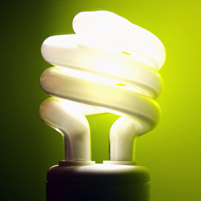Shedding Light

Shahzeen Attari (E'05,'09) is fascinated by how humans interact with technology and nature.
For her doctoral research at Carnegie Mellon University, she studied the intersection between human behavior and climate change.
"It draws on both engineering and psychology — and provides a great way to address sustainability more holistically," she said.
Her recent study focused on misperceptions people have about energy consumption and savings. Participants were asked: what is the most effective thing you can do to conserve energy?
"They thought in terms of cutting back on activities rather than improvements in energy efficiency," Attari said.
"In other words, they thought of turning off the lights rather than buying efficient light bulbs, which contrasts expert recommendations."
Twenty percent of the participants stated that the most effective thing they could do was turn off the lights, she noted.
"It's easy to do and doesn't involve any upfront costs, but may not be very effective to address energy consumption and climate change," she explained.
She added, "This may be particularly problematic if coupled with the single action bias, where individuals may simply turn off a light and think they have done their part to address climate change."
Some more effective behaviors are weatherizing your home, carpooling and using energy-efficient appliances.
The study found that people can roughly rank order devices correctly in terms of how much energy they use. For example, they know a dishwasher uses up more energy than a laptop in one hour; however, they do not know how much more energy a dishwasher uses compared to a laptop.
People also severely underestimate energy consumption for large devices, such as an air conditioner. The findings are published online and highlighted more in a recent Economist article.
Attari appreciates that CMU allows researchers to follow their questions "completely untethered to their own tool set or departmental boundaries."
She said, "We hope our work sheds light on the current misperceptions people have about energy consumption and savings so that we can both improve perceptions and change behavior."
She added, "Climate change, changes in ecosystem processes and biodiversity loss are all at stake."
Attari co-authored the study with Michael DeKay of Ohio State University; Cliff Davidson from Syracuse University; and Wändi Bruine de Bruin of Carnegie Mellon University.
Related Links: Read the Paper | Civil & Environmental Engineering | Engineering & Public Policy | Environment at Carnegie Mellon
